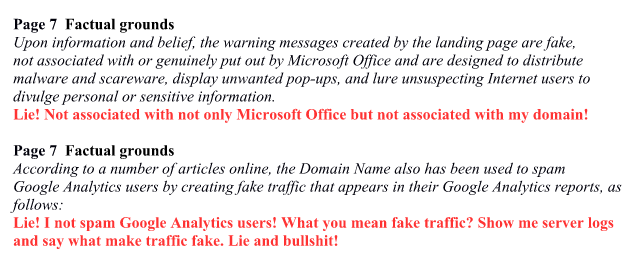Image: Benny Marty/Shutterstock
Google is probably pretty pissed off. An alleged Russian spammer recently used a domain strikingly similar to Google.com to flood websites' analytics with unwanted pro-Trump messages, and Google is now trying to wrest control of the URL.But Vitaly Popov, the site's owner, is not giving up without a fight, no matter how unlikely he is to win.Late last month, Google filed a complaint with an arbitration forum over Vitaly's ɢoogle.com domain. As you might notice, the "G" in ɢoogle.com looks a little off. That's because Popov registered the website back in March 2016 with the Latin version of the letter, meaning he can produce a URL that looks very similar to Google.com, but that sends visitors elsewhere. Popov has done the same for the "K" in lifehacĸer.com."Google requests that the Panel issue a decision that the Domain Name registration be transferred to Google," the company's complaint, provided to Motherboard by Popov, reads. (A member of the arbitration forum, called ADR Forum, confirmed that there was an ongoing dispute between Google and Popov).In its complaint, Google claims that Popov's phony domain redirects visitors to a landing page with a slew of dodgy pop-ups, including one that asks for a Windows username and password."Upon inspection and belief, the warning messages created by the landing page are fake, not associated with or genuinely put out by Microsoft Office and are designed to distribute malware and scareware, display unwanted pop-ups, and lure unsuspecting Internet users to divulge personal or sensitive information," the complaint adds.Naturally, Google is concerned that there is a high likelihood of confusion between their own website and Popov's domain. Google also points to Popov's recent wave of messages on Google Analytics, in which he produced referrals using the domain that looked like they came from Google itself.Popov, for his part, is determined to point out every alleged falsehood in Google's complaint. In another document, out of over a dozen that Popov shared with Motherboard, he has highlighted paragraph by paragraph supposed inaccuracies with Google's complaint. "Lie! Not my domain!" Popov writes in bright red text regarding the site with dodgy pop-ups."Lie! I'm not a spammer!" he continues. Much of Popov's argument seems to revolve around that he doesn't send traditional spam emails."There is no one fact of mailing me advertising messages which can be identified as SPAM in accordance with the opinion of officials of the United States. Not one proof!" Popov writes, and points specifically to the Can Spam Act, which spells out when businesses can send messages en masse.But Popov has flooded plenty of peoples' Google Analytics with unwanted messages, including blurbs supporting Donald Trump in the run-up to the US election. He even bombarded sites with a link to a Motherboard article covering his activity.Popov also claims that ɢoogle.com never sent visitors through to the sites Google points to. Instead, it redirected to another domain, ilovevitaly.com, Popov claims.A Google spokesperson told Motherboard in an email that "We don't comment on pending legal matters."
"Lie! Not my domain!" Popov writes in bright red text regarding the site with dodgy pop-ups."Lie! I'm not a spammer!" he continues. Much of Popov's argument seems to revolve around that he doesn't send traditional spam emails."There is no one fact of mailing me advertising messages which can be identified as SPAM in accordance with the opinion of officials of the United States. Not one proof!" Popov writes, and points specifically to the Can Spam Act, which spells out when businesses can send messages en masse.But Popov has flooded plenty of peoples' Google Analytics with unwanted messages, including blurbs supporting Donald Trump in the run-up to the US election. He even bombarded sites with a link to a Motherboard article covering his activity.Popov also claims that ɢoogle.com never sent visitors through to the sites Google points to. Instead, it redirected to another domain, ilovevitaly.com, Popov claims.A Google spokesperson told Motherboard in an email that "We don't comment on pending legal matters."
Advertisement

Advertisement
